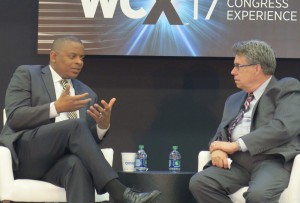
Former Transportation Secretary Anthony Foxx (left) discusses the future of autonomous vehicles. Photo credit: Lindsay Brooke.
The introduction of fully autonomous vehicles appears to be about five years off although sophisticated vehicles with autonomous features will become more common during the next two to four years, formers U.S. Secretary of Transportation Anthony Foxx said during an appearance at the SAE’s annual meeting and exposition in Detroit.
However, it will be at least 20 years or more before autonomous vehicles are the predominant form of transportation, according Foxx, who served as President Barack Obama’s Secretary of Transportation began laying out the first federal guidelines for autonomous vehicles.
Foxx said autonomous technology is moving forward quickly. Within the next two to four years, vehicles with Level Two, Level Three and Level Four autonomy, which is just short of full autonomy, will become more widely available. It will take another five years before fully autonomous vehicles reach the road, he said.
For legal reasons, the introduction of fully autonomous vehicles will be carefully controlled, Foxx predicted.
(Ford takes lead in race for autonomous vehicles. Click Here for the story.)
However, Foxx also noted consumer preference may have less influence over how autonomous vehicles enter the fleet than “business to business” relationships between manufacturers and various services that would deploy the vehicles.
“I think it won’t be a consumer-led change, it will be a business-led change,” he said.
Foxx also predicted that autonomous vehicles will not require any kind of push from the government to gain wider acceptance. “I don’t see a mandate for autonomous vehicles,” he said.
(Uber autonomous car crashes in Arizona. Click Here for the story.)
The introduction of autonomous vehicles also dovetails with other changes that will change the automotive business over the next several years, notably the increasing use of ride-hailing and car-sharing.
“I think it’s a market question,” he added, noting that consumers are becoming less interested in owning or leasing a vehicle. I’m not sure I’m going to buy another car,” Foxx said.
(Waymo, Uber go to court over alleged theft of autonomous vehicle tech. Click Here for the latest.)
Instead, like many Americans, particularly Baby Boomers, whose preferences have shaped and re-shaped the automobiles business since the 1960s, he may opt to spend his personal transportation budget on ride-sharing or car-sharing services, he said.
